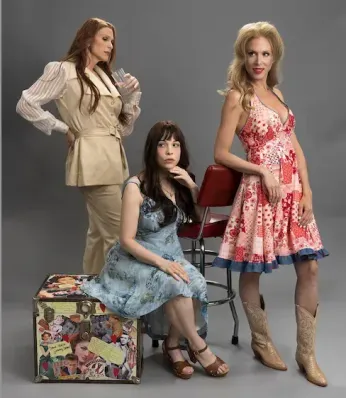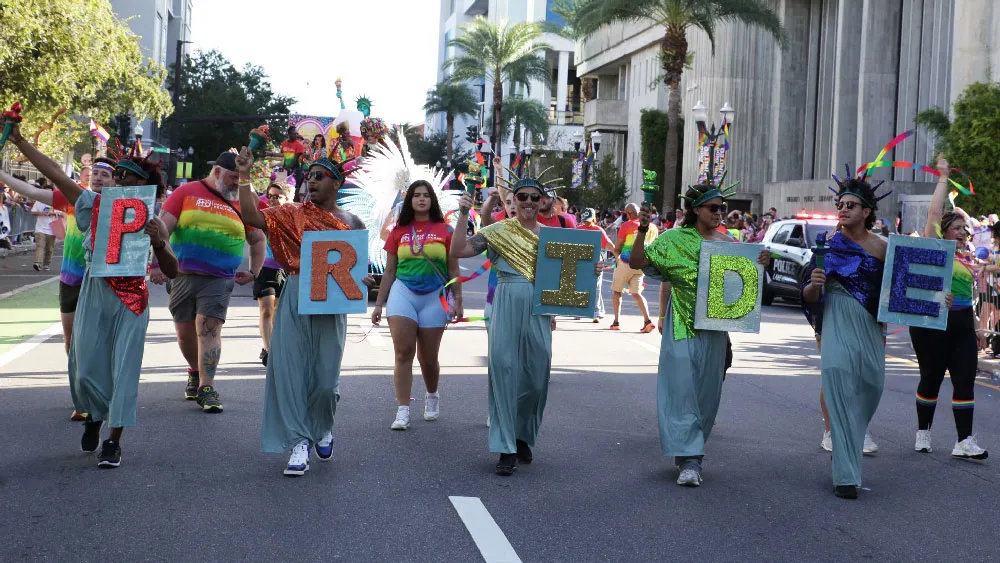
Jun 10
‘Come Back to the 5 & Dime, Jimmy Dean, Jimmy Dean: A New Musical’ – TheatreWorks’ world premiere musical celebrates trans and cis sisterhood
Jim Gladstone READ TIME: 1 MIN.
A new musical with impressive queer cred will have its world premiere production at TheatreWorks Silicon Valley this Pride month. “Come Back to the 5 & Dime, Jimmy Dean, Jimmy Dean; A New Musical,” based on the 1976 play by Ed Gracyzk, which was later adapted for film by Robert Altman, has been put together by a trio of accomplished queer creatives.
The show’s book is by Ashley Robinson, whose stage adaptation of “Brokeback Mountain,” a hit in London, was called “fresh and deeply moving” by the story’s original author, Annie Proulx.
The music is by Dan Gillespie Sells, the openly gay frontman of UK band The Feeling, who collaborated with Robinson on “Brokeback Mountain,” and wrote the score to the teen drag queen musical “Everybody’s Talking About Jamie.”
And the show’s lyricist, Shakina, who also stars as trans character Joanne, has a multifaceted portfolio that includes writing for and performing in the musical finale of television’s “Transparent,” and founding a music theater development company that helped launch more than 100 shows, including “A Strange Loop.”

Deeper into the past
The show is set in a Woolworth’s store in small town Texas, fifty miles from where James Dean’s “Giant” was filmed in 1955. The ensemble, a group of local women, gather to mark the 20th anniversary of their Dean fan club and, in flashback, recall their own younger years.
When Dean died at age 24, two weeks before filming wrapped, he was fixed in eternal, idealized youth. But the women of “Come Back to the Five and Dime” weather the passage of time and the complications of adult life.
Gracyzk, who was never forthcoming about his own sexuality, created a groundbreaking character in Joanne: a trans woman portrayed with warmth, humanity, and realism, in 1976.
A quarter-century down the road, the new musical probes further into the psyches of Joanne and her cohort, using songs to illuminate inner feelings about gender, chosen family, motherhood and more.
Southern comfort
Ashley Robinson first discovered “Come Back to the 5 & Dime, Jimmy Dean, Jimmy Dean” as a kid in small town South Carolina.
“I grew up in a fairly remote rural area,” he told the Bay Area Reporter in one of two recent interviews with the show’s writers, “so it was a big deal when we first got cable TV.”
One of Showtime’s heavy-rotation staples at the time was the movie version of “Come Back to the 5 & Dime...” which boasted a stellar cast, including Cher, Sandy Dennis, Karen Black, and Kathy Bates.
“I watched it over and over,” Robinson recalled. “It was just something that spoke to me as a queer kid. There are lots of gay men who love ‘Steel Magnolias’ this way [Playwright Robert Harling was gay]. I do too, but ‘Five and Dime’ is like a weirder, grittier Tennessee Williamsesque ‘Steel Magnolias.’
“I was watching the movie for the thousandth time sometime in 2017 or 2018 and, in the back of my mind I’m always on the lookout for things to adapt. In the third quarter of the movie, there’s just monologue after monologue, and I realized that they this could be a musical. The songs could reveal things the characters wouldn’t be able to articulate in conversation.”

Raising trans voices
Shakina, who was introduced to Robinson through a then-mutual agent during the pandemic, embraced the opportunity to collaborate on the project.
“I grew up with the play,” she recalled, “because when I was in high school all the girls were doing the monologues as audition pieces. After I connected with Ashley, I watched the film for the first time, and it felt so precocious and prescient. I love the whole genre of queer camp that’s a gay male-derived view on trapped femininity, and how that translates into the portrayal of fragile, broken, or brazen women that these playwrights were forced to channel their desire and fantasies through.”
Like Robinson, she points to “Steel Magnolias” as a period counterpart.
“They give us these beautifully drawn archetypal characters but they’re sort of glazed in a gay male point of view from that era. When I was asked to join this team, I realized that it was an opportunity to bring an authentic, lived experience of trans femininity to the show that wasn’t limited to Joanne, but also extended to Joe.”
In the musical’s 1955 segments, we meet pre-transition Joanne, assigned male at birth.
Asked about the danger of imposing contemporary perspectives on characters who live in the 20th century, Shakina pushes back a bit.
“Transexuality was in the zeitgeist of the late 1970s as part of the sexual revolution. Everyone knew about Christine Jorgensen. Had it not been for AIDS and the rise of the conservative agenda, who knows where we’d be today?
“When Joanne revealed herself to her old high school friends [in the original play], they asked a few overly personal questions at first, made a few jokes, but then pretty much took it in stride. It was never some shocking reveal in the play; it’s very much a homecoming that gets folded into the rest of the fabric of the story.
“I think that’s how transness has generally functioned in society up until the last five years. In some ways, I think that this story, set in the 1970s, has more of a progressive attitude than a lot of society has today, because it’s about an individual person, not about transness as an abstracted idea. Cis people need to have a connection with our humanness.”
Mothers and music
Shakina and her collaborators took the notion of trans individuality to heart over the course of the show’s development through workshops and readings, including one at TheaterWorks’ New Works festival last year.
Trans and nonbinary actors have provided detailed feedback while playing Joanne and Joe. A trans dramaturg worked with the production during a workshop at Northwestern University. And trans women elders provided insights on their experiences during the show’s era.
“It was so important to have multiple trans voices informing the show,” said composer Gillespie Sells, a queer man who was raised by his father and two radical lesbian mothers.
“I’ve always had lots of trans people around me. You realize very quickly that every trans experience is different.”
While Gillespie Sells’ band, the Feeling, specializes in power pop and his score for “Everybody’s Talking About Jamie” leans into disco and contemporary glam, he’s long had a passion for the rootsy country and western sounds that infused his score for “Brokeback Mountain” (a play with music, in which the characters themselves didn’t sing) and now “Come Back to the 5 & Dime...”
“I brought my obsession with Aaron Copland to ‘Brokeback,’” he said. “But this show was even more in my wheelhouse. I grew up traveling through the west of Ireland with my two mums, and in the camper van we’d listen to this triple-cassette collection called ‘Women of Country.’ Loretta Lynn, Dolly Parton, Tammy Wynette, Bobbie Gentry, all of these legends. And a lot of their hits were in the 1970s.
“When Ashley came to me with this show, I felt like I had it in my bones. Its ballads and story songs that take you into the minds of these strong but very different women.”
‘Come Back to the 5 & Dime, Jimmy Dean, Jimmy Dean: A New Musical,’ through July 13. $34-$94. Theaterworks Silicon Valley in partnership with Broadway & Beyond Theatricals, Mountain View Center for the Arts, 500 Castro St., Mountain View.
http://www.theatreworks.org

